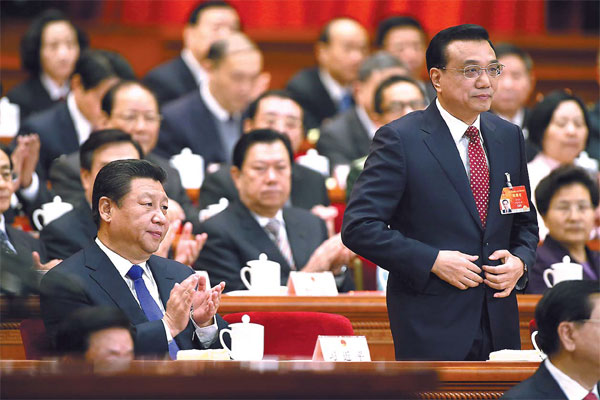Premier Li sets out economic goals

Leader tells two sessions meeting that country faces formidable challenges in 2015
The difficulties China will encounter this year may be more formidable than those of last year, Premier Li Keqiang said in his report on the work of the government at the opening of the annual session of the National People's Congress, following discussions that issues being highlighted at the legislative meeting are the most complicated and challenging in more than a decade.
Structural problems have become "tigers on the road" holding up China's economic development, Li said on March 5, urging comprehensive reforms and transformation of China's growth model.
| Premier Li Keqiang presents the report on the work of the governement on the thrid day of the two sessions. Wu Zhiyi / China Daily |
"Growth in investment is sluggish...while there is no sign that the international market is about to pick up significantly... Maintaining stable growth is becoming more difficult," Li said, as he explained the government was lowering the GDP target for this year, setting it at around 7 percent while keeping the consumer price index, a gauge for inflation, at around 3 percent.
National People's Congress lawmakers and members of the Chinese People's Political Consultative Conference National Committee are due to attend the meetings in Beijing starting on March 3. The two sessions will last until March 15, when Li is scheduled to meet the press and answer questions.
The government also pledged to create more than 10 million jobs in the urban areas this year.
Li highlighted popular entrepreneurship and innovation, as well as the supply of more public goods and services, as the two new engines to spur growth amid sluggish domestic and overseas demand.
According to a survey of 3.7 million netizens, China's economic new normal is among the top three topics expected to be discussed, along with income distribution and anti-graft efforts.
The result is slightly different from that of previous years when economic issues were not the top concerns of the public. Judicial independence, housing, food safety and other subjects have topped the list in the past.
Policy watchers said they expect China's leaders to come up with more clear-cut strategies to guarantee economic growth, provide more opportunities for society, and to facilitate reform at the meetings this year.
China's economy is expected to slow to an annual 7 percent in the first quarter of this year, according to the forecast by the State Information Center, and policymakers will have to roll out more stimulus to support faltering growth.
"Our country's economic growth still faces relatively heavy downward pressure amid structure adjustments," the think-tank said in its research report.
"As such, it will continue searching for a bottom in the first quarter of 2015 and is preliminarily forecast to grow around 7 percent in the quarter," it said.
Continuing weakness in industrial activity is forcing the Chinese government to adopt more aggressive policies to accelerate growth and increase employment, economists said.
"Maintaining growth is now the most important task for the leadership," said Lian Ping, chief economist at Bank of Communications.
Expectations that the US Federal Reserve may postpone its interest rate increase until the second half of the year could also push China's rate cut earlier than forecast, he said, Beijing may be more proactive through the first half of the year to spend more on government-led investment projects and provide more incentives to private investors and consumers.
Wang Ruifang, an economist at Nanjing University, said the nation has abandoned the blind pursuit of GDP growth, and adopt a serious approach to achieving a planned minimum level of GDP expansion.
Although this growth will not be as rapid as in the early stages of the country's development, maintaining a certain speed will still require some effort, Wang said.
Zhao Zhenhua, an economist at the Party School of the Central Committee of the Communist Party of China, said that to achieve required growth, the country will continue to look to government-led investment projects, help small companies with tax incentives, and support industrial innovation.
Liu Ligang, chief China economist at Australia and New Zealand Banking Group, said he is expecting an interest rate cut in March, following the central bank's decision to lower banks' reserve requirement ratio in February.
Du Yang, a demography researcher at the Chinese Academy of Social Sciences, said China must continue to raise industry competitiveness to create up to 10 million new urban jobs annually.
Many researchers have argued that legal and institutional changes will need to be made.
China International Capital Corp, a Chinese investment bank, said in a recent report that it expects the top legislature to make major revisions to the Securities Law, the Commercial Banks Law and the Law Against Unfair Competition, to further regulate government power and reduce business costs in China.
(China Daily European Weekly 03/06/2015 page3)
Today's Top News
- Japan tempting fate if it interferes in the situation of Taiwan Strait
- Stable trade ties benefit China, US
- Experts advocate increasing scope of BRI to include soft power sectors
- New engine powers cargo drone expansion
- China to boost green industry cooperation
- Manufacturing PMI rises in November































